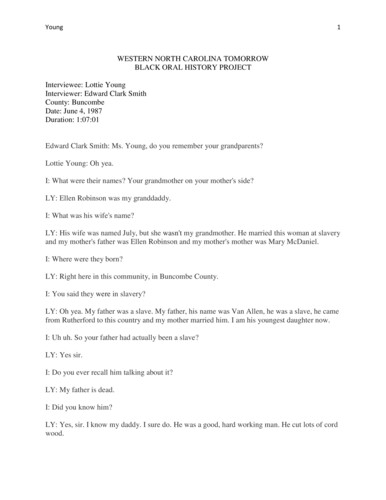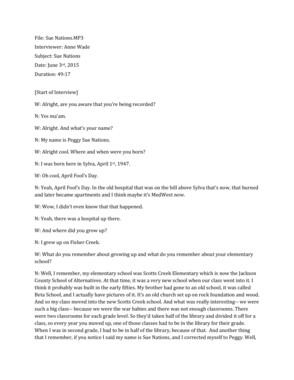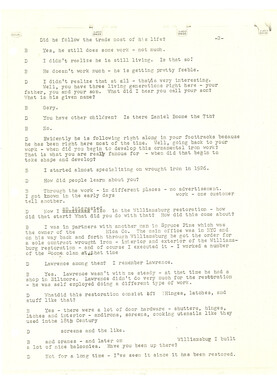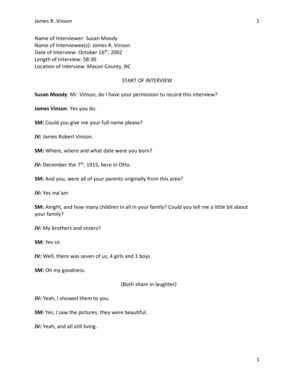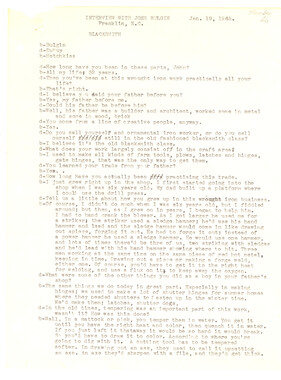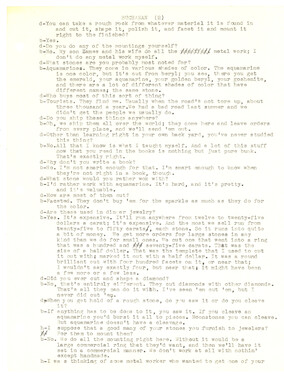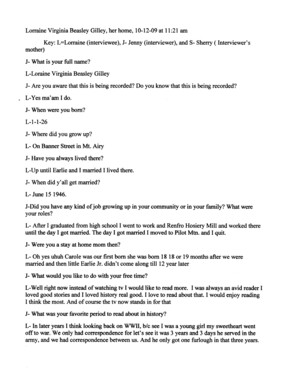Western Carolina University (20)
View all
- Canton Champion Fibre Company (2308)
- Cherokee Traditions (293)
- Civil War in Southern Appalachia (165)
- Craft Revival (1942)
- Great Smoky Mountains - A Park for America (2767)
- Highlights from Western Carolina University (430)
- Horace Kephart (941)
- Journeys Through Jackson (154)
- LGBTQIA+ Archive of Jackson County (26)
- Oral Histories of Western North Carolina (314)
- Picturing Appalachia (6772)
- Stories of Mountain Folk (413)
- Travel Western North Carolina (160)
- Western Carolina University Fine Art Museum Vitreograph Collection (129)
- Western Carolina University Herbarium (92)
- Western Carolina University: Making Memories (708)
- Western Carolina University Publications (2283)
- Western Carolina University Restricted Electronic Theses and Dissertations (146)
- Western North Carolina Regional Maps (71)
- World War II in Southern Appalachia (131)
University of North Carolina Asheville (6)
View all
- Allanstand Cottage Industries (62)
- Appalachian National Park Association (53)
- Bennett, Kelly, 1890-1974 (1388)
- Berry, Walter (76)
- Brasstown Carvers (40)
- Carver, George Washington, 1864?-1943 (26)
- Cathey, Joseph, 1803-1874 (1)
- Champion Fibre Company (233)
- Champion Paper and Fibre Company (297)
- Cherokee Indian Fair Association (16)
- Cherokee Language Program (22)
- Crowe, Amanda (40)
- Edmonston, Thomas Benton, 1842-1907 (7)
- Ensley, A. L. (Abraham Lincoln), 1865-1948 (275)
- Fromer, Irving Rhodes, 1913-1994 (70)
- George Butz (BFS 1907) (46)
- Goodrich, Frances Louisa (120)
- Grant, George Alexander, 1891-1964 (96)
- Heard, Marian Gladys (60)
- Kephart, Calvin, 1883-1969 (15)
- Kephart, Horace, 1862-1931 (313)
- Kephart, Laura, 1862-1954 (39)
- Laney, Gideon Thomas, 1889-1976 (439)
- Masa, George, 1881-1933 (61)
- McElhinney, William Julian, 1896-1953 (44)
- Niggli, Josephina, 1910-1983 (10)
- North Carolina Park Commission (105)
- Osborne, Kezia Stradley (9)
- Owens, Samuel Robert, 1918-1995 (11)
- Penland Weavers and Potters (36)
- Roberts, Vivienne (15)
- Roth, Albert, 1890-1974 (142)
- Schenck, Carl Alwin, 1868-1955 (1)
- Sherrill's Photography Studio (2565)
- Southern Highland Handicraft Guild (127)
- Southern Highlanders, Inc. (71)
- Stalcup, Jesse Bryson (46)
- Stearns, I. K. (213)
- Thompson, James Edward, 1880-1976 (226)
- United States. Indian Arts and Crafts Board (130)
- USFS (683)
- Vance, Zebulon Baird, 1830-1894 (1)
- Weaver, Zebulon, 1872-1948 (58)
- Western Carolina College (230)
- Western Carolina Teachers College (282)
- Western Carolina University (1794)
- Western Carolina University. Mountain Heritage Center (18)
- Whitman, Walt, 1819-1892 (10)
- Wilburn, Hiram Coleman, 1880-1967 (73)
- Williams, Isadora (3)
- Cain, Doreyl Ammons (0)
- Crittenden, Lorraine (0)
- Rhodes, Judy (0)
- Smith, Edward Clark (0)
- Appalachian Region, Southern (2399)
- Asheville (N.C.) (1917)
- Avery County (N.C.) (26)
- Blount County (Tenn.) (161)
- Buncombe County (N.C.) (1671)
- Cherokee County (N.C.) (283)
- Clay County (N.C.) (555)
- Graham County (N.C.) (233)
- Great Smoky Mountains National Park (N.C. and Tenn.) (510)
- Haywood County (N.C.) (3522)
- Henderson County (N.C.) (70)
- Jackson County (N.C.) (4692)
- Knox County (Tenn.) (25)
- Knoxville (Tenn.) (12)
- Lake Santeetlah (N.C.) (10)
- Macon County (N.C.) (420)
- Madison County (N.C.) (211)
- McDowell County (N.C.) (39)
- Mitchell County (N.C.) (132)
- Polk County (N.C.) (35)
- Qualla Boundary (981)
- Rutherford County (N.C.) (76)
- Swain County (N.C.) (2113)
- Transylvania County (N.C.) (247)
- Watauga County (N.C.) (12)
- Waynesville (N.C.) (73)
- Yancey County (N.C.) (72)
- Aerial Photographs (3)
- Aerial Views (60)
- Albums (books) (4)
- Articles (1)
- Artifacts (object Genre) (228)
- Bibliographies (1)
- Biography (general Genre) (2)
- Cards (information Artifacts) (38)
- Clippings (information Artifacts) (191)
- Crafts (art Genres) (622)
- Depictions (visual Works) (21)
- Design Drawings (1)
- Drawings (visual Works) (184)
- Envelopes (73)
- Facsimiles (reproductions) (1)
- Fiction (general Genre) (4)
- Financial Records (12)
- Fliers (printed Matter) (67)
- Glass Plate Negatives (381)
- Guidebooks (2)
- Internegatives (10)
- Interviews (812)
- Land Surveys (102)
- Letters (correspondence) (1013)
- Manuscripts (documents) (619)
- Maps (documents) (177)
- Memorandums (25)
- Minutes (administrative Records) (59)
- Negatives (photographs) (5835)
- Newsletters (1285)
- Newspapers (2)
- Occupation Currency (1)
- Paintings (visual Works) (1)
- Pen And Ink Drawings (1)
- Periodicals (193)
- Personal Narratives (10)
- Photographs (12976)
- Plans (maps) (1)
- Poetry (7)
- Portraits (1960)
- Postcards (329)
- Programs (documents) (151)
- Publications (documents) (2237)
- Questionnaires (65)
- Scrapbooks (282)
- Sheet Music (2)
- Slides (photographs) (402)
- Songs (musical Compositions) (2)
- Sound Recordings (796)
- Specimens (92)
- Speeches (documents) (15)
- Tintypes (photographs) (8)
- Transcripts (322)
- Video Recordings (physical Artifacts) (23)
- Vitreographs (129)
- Text Messages (0)
- A.L. Ensley Collection (275)
- Appalachian Industrial School Records (7)
- Appalachian National Park Association Records (336)
- Axley-Meroney Collection (2)
- Bayard Wootten Photograph Collection (20)
- Bethel Rural Community Organization Collection (7)
- Blumer Collection (5)
- C.W. Slagle Collection (20)
- Canton Area Historical Museum (2110)
- Carlos C. Campbell Collection (282)
- Cataloochee History Project (65)
- Cherokee Studies Collection (4)
- Daisy Dame Photograph Album (5)
- Daniel Boone VI Collection (1)
- Doris Ulmann Photograph Collection (112)
- Elizabeth H. Lasley Collection (1)
- Elizabeth Woolworth Szold Fleharty Collection (4)
- Frank Fry Collection (95)
- George Masa Collection (173)
- Gideon Laney Collection (452)
- Hazel Scarborough Collection (2)
- Hiram C. Wilburn Papers (28)
- Historic Photographs Collection (236)
- Horace Kephart Collection (861)
- Humbard Collection (33)
- Hunter and Weaver Families Collection (1)
- I. D. Blumenthal Collection (4)
- Isadora Williams Collection (4)
- Jesse Bryson Stalcup Collection (47)
- Jim Thompson Collection (224)
- John B. Battle Collection (7)
- John C. Campbell Folk School Records (80)
- John Parris Collection (6)
- Judaculla Rock project (2)
- Kelly Bennett Collection (1407)
- Love Family Papers (11)
- Major Wiley Parris Civil War Letters (3)
- Map Collection (12)
- McFee-Misemer Civil War Letters (34)
- Mountain Heritage Center Collection (4)
- Norburn - Robertson - Thomson Families Collection (44)
- Pauline Hood Collection (7)
- Pre-Guild Collection (2)
- Qualla Arts and Crafts Mutual Collection (12)
- R.A. Romanes Collection (681)
- Rosser H. Taylor Collection (1)
- Samuel Robert Owens Collection (94)
- Sara Madison Collection (144)
- Sherrill Studio Photo Collection (2558)
- Smoky Mountains Hiking Club Collection (616)
- Stories of Mountain Folk - Radio Programs (374)
- The Reporter, Western Carolina University (510)
- Venoy and Elizabeth Reed Collection (16)
- WCU Gender and Sexuality Oral History Project (32)
- WCU Mountain Heritage Center Oral Histories (25)
- WCU Oral History Collection - Mountain People, Mountain Lives (71)
- WCU Students Newspapers Collection (1744)
- Western North Carolina Tomorrow Black Oral History Project (69)
- William Williams Stringfield Collection (2)
- Zebulon Weaver Collection (109)
- African Americans (390)
- Appalachian Trail (35)
- Artisans (521)
- Cherokee art (84)
- Cherokee artists -- North Carolina (10)
- Cherokee language (21)
- Cherokee pottery (101)
- Cherokee women (208)
- Church buildings (167)
- Civilian Conservation Corps (U.S.) (110)
- College student newspapers and periodicals (1830)
- Dams (103)
- Dance (1023)
- Education (222)
- Floods (61)
- Folk music (1015)
- Forced removal, 1813-1903 (2)
- Forest conservation (220)
- Forests and forestry (1058)
- Gender nonconformity (4)
- Great Smoky Mountains National Park (N.C. and Tenn.) (181)
- Hunting (38)
- Landscape photography (10)
- Logging (103)
- Maps (84)
- Mines and mineral resources (8)
- North Carolina -- Maps (18)
- Paper industry (38)
- Postcards (255)
- Pottery (135)
- Railroad trains (71)
- Rural electrification -- North Carolina, Western (3)
- School integration -- Southern States (2)
- Segregation -- North Carolina, Western (5)
- Slavery (5)
- Sports (452)
- Storytelling (245)
- Waterfalls -- Great Smoky Mountains (N.C. and Tenn.) (66)
- Weaving -- Appalachian Region, Southern (280)
- Wood-carving -- Appalachian Region, Southern (328)
- World War, 1939-1945 (173)
Interview with Lottie Young
Item
Item’s are ‘child’ level descriptions to ‘parent’ objects, (e.g. one page of a whole book).
-
-
Young 1 WESTERN NORTH CAROLINA TOMORROW BLACK ORAL HISTORY PROJECT Interviewee: Lottie Young Interviewer: Edward Clark Smith County: Buncombe Date: June 4, 1987 Duration: 1:07:01 Edward Clark Smith: Ms. Young, do you remember your grandparents? Lottie Young: Oh yea. I: What were their names? Your grandmother on your mother's side? LY: Ellen Robinson was my granddaddy. I: What was his wife's name? LY: His wife was named July, but she wasn't my grandmother. He married this woman at slavery and my mother's father was Ellen Robinson and my mother's mother was Mary McDaniel. I: Where were they born? LY: Right here in this community, in Buncombe County. I: You said they were in slavery? LY: Oh yea. My father was a slave. My father, his name was Van Allen, he was a slave, he came from Rutherford to this country and my mother married him. I am his youngest daughter now. I: Uh uh. So your father had actually been a slave? LY: Yes sir. I: Do you ever recall him talking about it? LY: My father is dead. I: Did you know him? LY: Yes, sir. I know my daddy. I sure do. He was a good, hard working man. He cut lots of cord wood. Young 2 I: Was this after slavery? LY: Yes it was. And he had to feed us children. So that's how he made his living cutting cordwood and cutting ditches and things like that. Then he worked on the railroad, he helped laid this railroad through here, my father did. He was a night watchmen on the railroad. He'd come in sometimes and see him and he'd have to go out and flag dawn a train when he was afraid one would run into the other why he would flag them down and tell them and would have to take it off. He was 103 when he died. I: What about your mother, do you remember your mother very well? LY: Oh yea, I do. I: What was her name? LY: Mary Allen. My father was an Allen, he belonged to the Allens', he was a slave. He married my mother and she became Mary Allen. I: How old was she? LY: She was 65, she died quite young. Daddy was 103 when he died. I: You came from a family of long livers? LY: Yea. And, I am 101. I must have took it after him. We was all real hard workers. I’ve worked a many a day in the corn fields and many days before my daddy died when I was growing up, I had to go barefooted, we didn't have any shoes or nothing. I: When is your birthday? LY: The 28th day of August. I: What was it like when you were growing up? Was it different from now? LY: Oh yes. It sure was. You didn't know nothing much but cornbread to eat. That's what we had. Cornbread and milk and spicewood tea. Things like that, sassafras tea, do you know what that is? I: Uh huh. LY: Well that. Go to spring and wrap your feet in burlap, you know what that is? I: No. Wrap your feet in burlap? LY: Yea. You had to go barefooted, so we had to carry water. You know what totesack is don't you? Young 3 I: Uh huh. LY: Well, we'd cut them and put them on our feet and go on. I: Did you go to school or did they have it? LY: Yes, they had it. I went to the eighth grade, I had to quit and go to work I: How old were you when you stopped going to school? LY: Oh I went from the first to the eighth grade. About ten years old. Had to go to the corn field then and hoe com. I: How many brothers and sisters did you have? LY: Four brothers and four sisters? I: And you were the youngest LY: No, I am not the youngest. The youngest was Jessie Johnson, she married and moved to Charlotte and died down there. She married and went to Charlotte and was sent back home to us. No, I am not the youngest. I: You said your dad cut cordwood and worked on the railroad was it enough to support… LY: Yea, he laid this railroad, what you all are running over. So he worked in the field, hoed corn and that's where I raised my children in the field hoeing corn. I did myself. That girl you see here, that's my only daughter. She would tend to the little ones while I was in the field working. I: Did your mother work in the field too? LY: No, she done spinning you see. Spin and make yarn. Do you know how that is done? I: I have seen pictures of people doing it, but I have never seen it done. LY: My mother she had a spinning wheel, she'd start up yonder and throw that thread clean back up there wool of sheep’s back. You see the sheep haven't you? I: Uh huh. LY: Well take that wool off of them and wash it and take the cuckleberries off and make yarn out of it. Making stockings out of it. They was good ones. I: What were conditions like for your mom and dad when you were maybe 12-15 years old? Young 4 LY: Well, we all had to help one another. The oldest one had to work and ones that could tend to the little ones had to tend to them while they worked. I: How was things between white and black people? LY: The white people wouldn't pay no money, always give them a bushel of corn or some molasses or something like that. Didn't have no money. I: How did you get things that you need if you didn't have money? LY: Maybe they would have some old clothes or something they would give us. We didn't have no money. As far as our stockings, mother would spin yarn and make our stockings, she could make them. I can knit, but I can’t make stockings. I can crochet and make anything. I took that up. I: You do that now? LY: Yes, I sure can. Do you want to see some of my work? I: I sure do. What was growing up like as a child? How did you all entertain yourselves? LY: Well, we would get out and make rag dolls and play with them. My older brother was a preacher. He'd go to church and he'd preach to us. We'd shout like we was happy. They he'd go and baptize us and such things as that. That' s how we entertained ourselves. We'd bend bushes dawn and ride them like a horse. We called it a good time. I: Should do alot more of that now, shouldn't we? LY: Yea. Then we got big enough to go to the field and go to work. I: Where was the school, was it near you? LY: Yes sir. I: Do you remember the name of it? LY: It was Concord School. I lived in Concord, not here. That's back up near Fairview. I: Ok. LY: We'd all go to church. It was an old house, we called it church. We'd go up there and shout and go on like children would do, if we got tired of that, we'd climb trees and things like that. Bend them down and ride on them like horses. That's what we had to play with. I: But when you got older, you had to go to work? Young 5 LY: Oh yea. I: How old were you when you left to start working? LY: Oh, I was about 12 or 13. I: You went to the field? LY: Yes sir I did. I couldn't hoe corn, but I could thin it. Go along in front the one that was hoeing and thin the corn out. We had any beans to replant, we'd go along the ones hoeing the corn and drop a bean in that hill and they would cover it up and we'd go on in front of the plow. I: Did you have your own animals? LY: No rented. We didn't have nothing. I: You said you raised your kids doing the same thing. LY: Mr. John Burrell he is dead and gone now. He was awful good to us. He sure was. I: Who was he? LY: That was a white man. He worked in the field. I worked in the field a many a day with him hoeing corn, doing anything a man could do in the field except plow. I: What did they use to plow, mules? LY: Mules or horse either one. That's the way I raised my family. I: So you really never had a public job where you…? LY: Oh yes, I worked in Biltmore for four years as a public job. After I was grown and my children grown except my grandson is staying with them. At the Rag House, I worked there four years that's where I got a head start. Yes sir, they were nice to me down there. Worked on a double cutter down there. Cutting cloth, socks, anything. I would cut 150 pounds a day by weight. That was the last public job I had. I: You mentioned church, did you all go to church alot when you were young? LY: No, we had no clothes to go anywhere. There was an old church house up there where the white people had, we'd go up there and make like we was happy. I: Did grown people go to church? LY: Oh yea, my father and mother would go to church. They'd hitch up the oxen to the buggy and go on to church and the children would go up there and play and we was in church. Young 6 I: But you all didn't have clothes to wear? LY: No, we had nothing. I: What did you think of that? LY: I enjoyed every minute of it cause I knowed no better. I: Ms. Young, how did people get news back then, like now people turn on the television? LY: Oh, there was none of that. I: How did you find out things that happened? LY: Well, one would hear it and tell the other one. Since my husband died, I got a television. That's been a long time ago, no television and things then. Nobody had one. I: How did you all travel from place to place? LY: When I was young? I: Uh huh. LY: I didn't go nowhere, I stayed home and played. I: I mean did you ever go to town? Were there stores to go to? LY: No. We didn't go to no stores. We had nothing to go to the store with, wasn't no use in going. Couldn't get nothing. I: There was eight children in your family, right? LY: Yes. I: Where are you in that eight? LY: Well, there was four boys and four girls. I am the youngest there is living, all the rest are dead. I don't have no parents at all, no children at all. I: You have outlived them all? LY: Yea, I have. There's one of my sons coming there now and daughter-in-law. I: Ms. Young, how were you all raised, how did your parents raise you? Young 7 LY: Well they had to work my mother went to the wash tub, my daddy went to the [inaudible] and he helped lay this railroad, he worked on the railroad and my mother she had to go wash for white people. I: Did you ever work for white people? LY: Oh yea. I have raised a family of white people since I left Biltmore. I raised a family of six children for them, the Lesley's. They lived in Oak Park, and I stayed on the place there. They would go off and be gone for ten days and never see their children and I raised them. Yes sir. They would go to Atlanta for ten days and I'd take care of the babies and the two old grandfathers to wait on and take care of the children too. Washing and everything, but I had them under good control. I: How much did you make? LY: You know how white people is, they ain't got no money, but I had to work somewhere so I went there and they paid me real good, $3.00 a day. Sometime I would get $5.00 a day, and when I went to staying on the place I got bed and board and $5.00 a day. I: How did you raise your kids then? LY: Oh, they was all done grown and left me. I: How old were you when you got married? LY: I was about 22. My children done left home, nobody there but me. I was free to go and stay as long as I please. I went and just stayed with them. Raised their little family. Then I got sick or something and the last children they had was twins and when they was four years old I left them. Ann, Nancy, Mike, Tommy, Steven, and Linda. That is six I raised for them. They said they wished their parents would never come back when they would go off, cause they liked me better than they did their parents cause I whipped them, I reckon. They would just say "don't do so and so" go right on and do the same thing. When I spoke to them, I said I raised them like I raised mine, I get me a switch and if they don't do right, they would get it, and they did. I raised those children and didn't think nothing of it, I raised them just as I would if they were my own. I: And you were born right here in Buncombe County? LY: In Fairview Township, yes sir. That's where my mother died at, my father died there, all of them. I: Did any of your brothers and sisters get more education? LY: No sir. I: So everybody just sort of had to go to work? Young 8 LY: Everybody got to the eighth grade. That's about as far as we all got. Because we had to go to work. Go to the cornfield and work. Help make molasses, I can do that. If I could just stand on my feet like I used to. I've help Mr. Merrill make a many gallon of molasses. I would be night getting in home. You know how that is done? I: No ma’am. How is it done? LY: Well you raise your cane and then you had a [sweet] and put a horse to it and it would go round and round. Put that cane in that place like that and it would squeeze the juice out then had a big great long, looked like a pan or something, you just keep it going from one pan to the other. When it come out this end, it would be molasses. That's what would be. I stayed out 8:00 or 9:00 at night helping Mr. Merrill make molasses. There is always a way if you will try. I: What was a dinner like for you, what would you have? LY: We'd have milk and cornbread and molasses, such things as that. On Sunday maybe we would have a chicken. I: Did you have your own chickens? LY: No, we didn't have our own chickens. I: Why not? LY: We had no place to raise chickens. See, it takes feed for chickens and so on Monday morning when I would get up to go to… we called him uncle Mark cause he was a white man. We called him uncle Mark all the time because we wasn't allowed to say yes, no and what to nobody. They would have a big dinner. What was left over, when I would go and wash why then all that was packed up and give to me. My pay too for the day’s work and I would carry that home to my children. See, they had a good meal too. That's the way we come along. Yes Sir. My oldest son he lives in Asheville. His name is George Young. I was an Allen before I was married. My son lives in Asheville on Water Street. Do you know where that is? I: I believe I know George. LY: You do? I: I believe I do. LY: Well that is my oldest son that is living. My oldest son got killed I: How was he killed? LY: Well, his stepson shot him. And you know George? I: I believe I do. Young 9 LY: Well that's my oldest son that is living. I: I will have to go by and see him to make sure. LY: I guess you do. George, he is tall. I: How old is he? LY: I couldn't tell you, I can't keep up with his age. He is up in 70 's. My girl is 72, that's my daughter. We are all ageable, all of us. I think I have lived a very good life since I come from out of all that hard times. I: That was a hard time wasn't it? LY: Yes sir, it was. Think about a person going barefooted all winter. It was terrible. BJ.t we had to, we had no shoes. Maybe some white person would give my daddy an old pair of shoes and we'd take and cut the tops off another one and sew them to the top of them old shoes and just go right along. You had to. Wasn't no going to the store and buying no shoes. I: How did the white people live? LY: Oh the white people had everything then. There was some poor white people living just as hard as we was. The other people who had the money wouldn't let it loose. They kept it. A bushel of corn, irish potatoes, or a rocket of buttermilk. Something like that, you didn't have no money. I: How old were you when you had your first pair of store-bought shoes? LY: Me and my oldest sister grubbed off of new ground for him. I: What is grub? LY: You know sprouts that come up in the field like you cut down a tree and take a mattock and get all of that off of there and dig it up best you could so they could plow and that's what you call grubbing. I: I bet that was hard work. LY: Yes sir, that was real hard work. From that I went to the bean field to pick beans and.. I: Well how did you get your shoes the first time? LY: That's the way I got my shoes, doing that grubbing. I: Where did you get them? Young 10 LY: Oh my father went and got them for me. Shoes wasn't like they is now. When you wore a hole in them set down and get you a hickory tree and didn't have no tacks like they have now. Chew you off some peg and let them get dry, take a punch and punch a hole in there and drive that peg in there and put your sole back on the shoe. That's the way you do it. I bet if I was on my feet, that I could beat these young people working now. Cause I would work, I wouldn't play. Do you know Ness Brothers? I: I've heard the name. LY: I worked there four years on a double cutter. Cutting cloth and stuff on the double cutter. That was the last public job I had. I: Do you remember any droughts, floods that affected your family? LY: I remember a drought. People couldn't come in and there was a man by the name of Elmer Stroup used to own like over on this hill and there was an old house over on the other hill. That man couldn't get home because his water was so deep he couldn't come home. I: What year was this? LY: I don't know what year it was, I can't remember that. So me and my mother sit up all night it thundered and lightened and poured rain all night. Had a big pond up there and it busted. That man had to stay on in an old house over there till that water got out to get across to go home. I: What kind of house did you all have, what was it like? LY: We had a very good house then. So we set down and my father was in the bed asleep, he didn't hear nothing. Me and mother stayed up all night. I: You all were safe out of the storm? LY: Yes sir. We were safe. Next morning, we got out and everything was washed away. It was terrible. I: What did you all do? LY: I scrooched up down at my mother's feet and set there, that's what I done. I: Were you a little child? LY: I wasn't too awful little, I was just scared and I just scrooched up and set down right on the floor side of her and sit there. Young 11 There is my grandson coming up right now. They bring [inaudible] home and I don't want for nothing. I worked at Ness Brothers, well I get a check from them and Biltmore, you know where that is? I: Uh huh. LY: I draw a check from them every month. I: How much would it be? LY: It's not so much. I: No, I mean when you were working there. LY: Oh, it' s not so much, but I get more now that when I was working. Lots more now than I did when I was working cause… I: When you would go up town, you would go to Asheville? LY: Yea. I: What was uptown in Asheville like? LY: I didn't like it at all. I like the country. I didn't like town, cause people would get their check and when they got home from town they wouldn’t have nothing cause then done [inaudible] them. Huh uh, not me liking town. When I go there I tie mine up and put in my bosom and I know they ain't going to get it. That's the way I carry my money. I don't carry money like these people do with bags on their back, no sir, not me. I don't till this very day. Anybody could walk up behind you and cut that strap and jerk your pocketbook and run. I: You say you were telling me how you got your shoes. How did you get your dresses and stuff, did your mama make them for you? LY: time. Oh yes, she made our clothes. I: Did she go buy the cloth and make them? LY: Yes, she would buy what you call [alton], do you know what that is? I: Huh huh. LY: Well, it's cloth with fuzz on it. We'd all get a dress a piece. I: You call it [alton] and it had fuzz on it? LY: Yea. Young 12 I: Would it wear off or something? LY: Yea. You stick a match to it and it would burn off. I: You was lucky you didn't catch on fire then! LY: Yea, I was lucky. I: It's hard for me to understand how hard that was, but that was a hard time LY: It really was. I: Did any black people have money at that time? LY: No, nobody had nothing. Uncle Harley raised bees, he'd carry his bees down to Fletcher, you know where Fletcher is at? I: Uh huh. LY: He'd sell his honey and all, and he had a little money. But now we had no money. I: Did your mom and dad ever have money? LY: Not until after all that hard time was over. I: But you weren't in slavery were you? LY: No, I wasn’t enslaved. They'd pay them a dollar a day for working, that's the way they got their little money. That wasn't nothing. I: When did you start going to church, what age were you? LY: I don't know, well let's see. I guess I was about nine or ten years old. I: Was church different then than it is now? LY: It was better then than it is now. People wasn't looking to see what they had on or go tack hare and talk about what they had on. Next time you see that one, they'd try to have the same thing on and the other one did. I: Was the service any different, the preachers any different? LY: No. They weren't like preachers is now. They went without price or money. Maybe they would get 25 or 30 cents in the collection and they'd go on just as happy as if they had 50 dollars. No, you didn't get no money cause they didn't have no money to give. Maybe sometimes have Young 13 something at the house they could give them and they'd go on about their business. Uncle Frank Hemphill, you don't know him, I know you don't. He's come to our house a many times. He' s say, "Don't try to cook me nothing fancy, just some milk and cornbread." That's what they would eat and go on. They's just eat whatever you got and be happy with it. I: What church do you go to? LY: I ain't been to church now since let's see how many times have I been to church. I 'be been down to this church one time and been home three times since I left there. See we don't have no car and it's hard when I can't pay nobody to carry me nowhere. I just stay at home. I've got my bible and I read here. That's what I do. I: Do you recall, what was Christmas like? LY: Well Christmas, my mother would bake a big cake of sweetbread made with molasses and make us a gingerbread boy and maybe we would get an apple and that gingerbread boy and maybe a stick of candy and that would be all. But we was happy over that. I: Do you remember any holidays that black people celebrated that other people didn't? LY: No, I don't. I don’t remember none of them holidays. Our holidays was in the woods tearing what few clothes we had in the trees, playing, that's what we did. We didn't go to church, no cause we didn't have clothes to wear to go to church. Mother and Father went to church and they'd hook the oxen to the buggy. I: Did they [inaudible] LY: Yea, he had a nice horse, called it Spivey. Mother and daddy would go on to church. I: Did you drive the oxen and the buggy? LY: No. I never did fool with no oxen. Yea, the little oxen was named Spivey. So they'd go to church and come back. I: You all would play until they came back? LY: Yes sir. We'd be playing in the old church having our church. We'd just play it though. That's what we done. We knowed not to do anything else but that. We'd payed for it when they come back if we done anything else besides what they told us to do. I: How many rooms did you have in your house? LY: Oh, we had one log cabin and the kitchen. We didn't have no great big house, no fine house or nothing. Just a log house and a kitchen built on to it and that was all. I: So all of you were in one log house? Young 14 LY: Yea. I: Did you have running water? LY: No. Had to go to the spring and carry that water. No pipes, nothing like they got now. None of that. Huh uh. We didn't know no difference, that's all we'd been used to. It didn't go hard with us, we carried that water. Then we'd go play. No, didn't have what they have these days and in one sense of the matter, we was better off. Seems like there wasn't so many on the chain gang. I: Uh huh. LY: Cause we didn't steal nothing, we'd go to the mountain and play and have more fun up there and come on back to house. Wasn't no sheriff looking out after us cause we hadn't done nothing only played. I: Uh huh. LY: Now they are breaking in, stealing and everything else which we didn't do. It was better times back then, don't you think so? I: In a lot of ways. LY: Yes sir. I think so myself. You get on the chain gang, you have to stay there and can't get off. I: Did you ever have any people you knew on the chain gang? LY: Yea, my son went on the chain gang one time, but it wasn't for stealing. I got him off and he ain't never been in no more trouble. No more trouble. I: What were the chain gangs like, did you ever see them? LY: Well, used to work about a mile from my house when I lived at hare. Was hard work digging ditches, working on the road, sure was hard work. Lots of colored people there. When they could of been somewhere else at work getting paid for it. They wouldn’t getting nothing. They was out there working and paying their fine for stealing and such as that. Lots of times a guard standing over them with a gun. If they run, they shoot them. Yes sir. White man standing over them with a gun. Them niggers was working too. I: They had to work. LY: Yea, they sure did to pay for what they had done. I: What can you remember when you were growing up that made you the happiest? LY: Yea. When I see my daddy caning home - cause I know I was going to get me a chew of tobacco! Young 15 I: You used to wait on him to come home? LY: Yea. I knowed he'd cut off a little, he'd say "here Pet." I: What did he call you? LY: Pet. He called me his Pet. I'd take it and go on off and play. Chew my tobacco. I: Did you ever raise tobacco on any of those farms you were on? LY: No. Huh uh. My daddy chewed tobacco all the time, he'd buy him a twist of tobacco. You have seen twists of tobacco haven't you? I: Not in a long time. LY: Well, he'd have it in his pocket and he'd take it out and hand it to me and say "Here Pet." I: Did you enjoy it? LY: Yes sir, I sure did. I: Was it sweet? LY: No, it wasn't sweet, tobacco raised out in the field. Huh uh. I: He knew you enjoyed it didn’t he? LY: Uh huh. I: Did you all ever play with the white children in your community? LY: Yea.
Object
Object’s are ‘parent’ level descriptions to ‘children’ items, (e.g. a book with pages).
-
Lottie Young is interviewed by Edward Clark Smith on June 4, 1987 as a part of the Western North Carolina Tomorrow Black Oral History Project. Young was born in 1886 and her father had been enslaved. She recalls growing up without clothes to go to church and no shoes. She and her siblings were educated through eighth grade and then went to work in the fields. Young describes some of the jobs they had to do such as grubbing and making molasses. Young remembers working for Ness Brothers as a cloth cutter and after her children were out of the home she raised the children of another family.
-
